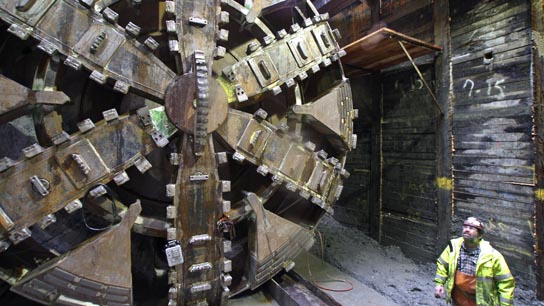According to a new class-action lawsuit filed in US District Court, African American workers involved in the construction of the UW Sound Transit Link Light Rail Station tunnel were the victims of racial discrimination. The lawsuit, which includes six workers at this point and was filed by local employment attorney Stephen Teller of Teller & Associates, PLLC, names the Indiana-based Traylor Brothers, Inc. as a defendant, along with a three-way joint venture that included Traylor and Frontier-Kemper. As Mike Lindbloom of the Seattle Times notes in his post on the lawsuit, “Traylor-Frontier-Kemper (TFK) won the $314 million contract to build a pair of 21-foot diameter transit tubes from Husky Stadium to mid-Capitol Hill.”
The station is expected to open in early 2016. According to Sound Transit, TFK finished their work in June, 2013. Sound Transit confirms it no longer works with the company.
Among the allegations listed in court documents, the lawsuit contends that “Traylor Brothers foremen failed to provide meaningful work to experienced journeymen and assistant journeymen who are African Americans, routinely dismissed them before dismissing Caucasian workers, failed to follow their own employee/discipline policies, and claimed they could assess African American workers by merely talking to and looking at them.” The lawsuit also alleges that a superintendent at the construction site had a swastika tattoo on his hand.
“Every day, I would arrive waiting for an assignment to do a job that I could do. And every day, when the assignments were given, another African American worker and I stood waiting, but no work would be assigned to us,” said Anthony Smith, one of the African American workers involved in the lawsuit. “So we’d track down the Superintendent, and ask what our jobs would be. Day after day after day, he told me to go pick up paper. After so many days, there was no more paper to pick up.”
Sound Transit was made aware of the complaints and investigated at the time. As Lindbloom explains in the Times, “The agency’s reports said that investigator Marcella Fleming identified eight cases where race may have been a factor in somebody either being released or not hired. A statistical analysis also found that TFK was prone to dismiss black workers at a much faster rate than white workers.” According to the Times’ story, TFK responded by citing safety concerns and saying the workers in question lacked specific skills necessary for the job.
“From my clients perspective, whenever there’s discrimination we need to stand up against it whenever we can,” Teller tells Seattle Weekly. “People think a lot of the time that filing a lawsuit is about getting money. Really, the reason that filing a lawsuit exists is for making the person who did the wrong thing, to slow them down … to make them more careful, and prevent them from breaking laws.”
Steve Owen, the general counsel for Traylor Bros. Inc., responded to an inquiry from Seattle Weekly. He stressed that while Traylor Brothers, Inc. is listed as a defendant in the lawsuit, it was the joint venture of Traylor Bros., Frontier and Kemper that was hired to do the UW Light Rail tunnel work, classifying TFK as a “separate legal entity.” That said, Owen maintained that, “We categorically deny the allegations in the complaint.”
“This goes back two and a half years,” Owen continued, saying that TFK fully cooperated with the Sound Transit investigation and prepared a detailed response to all the allegations levied, including these exhibits.
“There’s nothing new to us here, other than they finally got around to filing the complaint,” Owen says.
The lawsuit seeks punitive damages and direct compensation, including lost wages, though no exact dollar amount is listed. According to Teller, more workers are likely to sign on to the class-action lawsuit – perhaps as many as 30. He says the legally required response from Traylor-Frontier-Kemper will allow his firm obtain a list of all workers on the UW Link Light Rail Station project. “We’ll certainly be contacting those employees” for witness interviews, he says.
A judge must still decide whether the lawsuit meets class-action status. If it doesn’t, Teller says he expects to move forward with lawsuits on behalf of individual plaintiffs.









